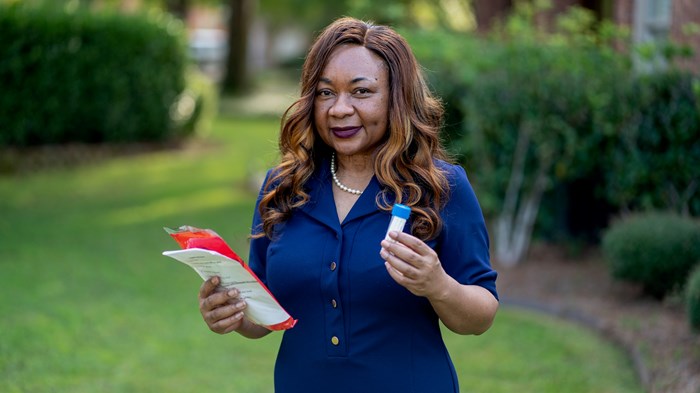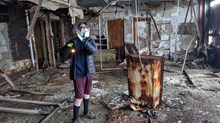Wastewater Injustice? Yes, It's a Serious Problem in Rural America

In her new book “Waste: One Woman’s Fight Against America’s Dirty Secret,” Catherine Coleman Flowers refuses to conceal the toxic reality of environmental injustice in the U.S. She experienced it first-hand in her home of Lowndes County— just down the road from Selma, Alabama—where families’ health and safety is endangered by inadequate sanitation infrastructure. It’s a problem felt in America’s “Black Belt” as well as other rural communities around the country.
But Flowers also refuses to conceal her hope. Bringing light to a largely invisible issue, the truth-teller mobilizes communities, churches and policymakers to take action. In Flowers’ journey from a young civil rights activist to a seasoned environmental justice advocate, her fellow Christians will recognize a divine calling.
In March, we spoke with Flowers about her work to fight environmental injustice, the relationship between faith and activism, and how Christians can help protect the future of our neighbors and the planet we call home.
Sarah Holcomb: What does environmental injustice look like?
Catherine Flowers: Environmental justice issues arise when decisions are made to adversely impact people —who are generally marginalized or poor—that put profit over their health. And those communities aren’t at the table.
In “Cancer Alley,” people are getting sick because petrochemical plants are polluting the air and water. In Appalachia, [the coal industry] is blowing tops off the mountains. In Lowndes county, Alabama, where I grew up, septic systems are failing, creating a severe sanitation problem. Marginalized communities have always dealt with inequities when it comes to infrastructure. These issues are what’s in store for all of us if we do not deal with climate change.
SH: For you, what scriptures resonate with the calling to pursue environmental justice?
CF: I go back to Genesis. I think we misinterpret Genesis to mean that we do anything we want to the Garden of Eden. The way the story has been told, Eve ate the apple she wasn't supposed to eat— but now we're doing the same thing. When we're blowing the top off mountains, we're eating the apple. When we're fracking to the point that we're causing earthquakes, we're eating the apple. What’s at stake is humankind—what are we going to leave generations to come? In the Bible I see examples of how we're supposed to be caretakers, instead of extracting and destroying [the Earth’s resources].
SH: How did faith influence your upbringing in Lowndes County, Alabama?
CF:My father was a member of the Christian Methodist Episcopal church, and my mother was a member of the Baptist Missionary church. We had circuit pastors in the rural communities, so we would go to both churches.
The lessons I learned in Sunday school made me who I am. As I've gotten older, I’ve learned that those lessons can be very powerful if you see them in action, reinforced in your home and community. Fortunately for me, selfishness was not a part of my experience growing up—it couldn't be in a family of seven, where I was the oldest child. It couldn't be in a community where the reason we survived was because we had to share. I came from a tradition where if you have blessings, you don't keep those blessings to yourself. Your blessings are multiplied when we share them with other people. And I think the more we move away from those traditions, it leads to the problems in society we're seeing right now.
SH: Describe the wastewater problem in Lowndes County.
CF: In Lowndes County, you see three different types of failures when it comes to septic systems. First, some people don't have sewage treatment at all. Sewage empties out the pipe by the house or in a pasture, a ditch, anywhere. Second, some who have paid for wastewater treatment had their systems fail, meaning the sewage comes back into the home. The third problem is with treatment plants— it usually involves sewage lagoons, where the yard floods with sewage from the entire community. I've gone to other areas, like Centerville, Illinois, where I saw just as much raw sewage on the ground. People are paying a wastewater treatment fee and still dealing with flooding. In my book, I describe it as “America's secret” because it is more prevalent than people realize.
SH: What is the connection between the wastewater problem and climate crisis?
CF: Climate change is a magnifier of all environmental justice issues. When it comes to the wastewater problem, the rising water table — as well as more frequent deluges of rain—make it harder for the septic systems to work. This technology has not been designed to deal with climate change. If water tables are rising in Lowndes County, three hours from the Gulf of Mexico, just imagine what's happening on the Gulf Coast and coastal regions around the country.
Climate change exacerbates all kinds of infrastructure problems. In communities like Lowndes County, many live in mobile homes or older homes that aren’t properly insulated, and power bills go up in summer because temperatures keep increasing. Dramatic shifts in weather lead to pipes bursting and damage to homes and buildings. Before I even discovered the wastewater problem, I was wondering about other health issues, like why so many people have asthma in rural communities. It’s getting so hot and humid that we’re seeing mold and mildew [which leads to breathing problems.]. The impact of climate change makes people who live in those areas just as vulnerable as COVID makes them vulnerable to death and sickness.
SH: How has the growing awareness around climate change impacted your work?
CF: People are now seeing the connection between climate change and health and environmental justice. Marginalized communities are the first to suffer, or suffer the most, because of existing inequities. What we've seen in Texas during the winter storm—people impacted by lack of insulation and infrastructure, access to food, some even burning houses to stay warm— is apocalyptic in a way, forewarning us that we do not take climate change seriously, this whole country and the whole world would be like Texas. I think we don't understand the magnitude of what happened there yet. But it reminds me of a Noah moment. When Noah told people that the flood was coming and they laughed at him, he built the ark anyway. We need to build an ark to protect ourselves from what's coming.
SH: How are you working with church communities to take action?
CF: I'm a senior fellow at the Center for Earth Ethics at Union Theological Seminary, where we provide environmental justice and climate justice training to ministers. Ministers have supported this work. Because the government doesn't have firm numbers on wastewater problem in this country, we're working to find the data ourselves. We're asking people to self-report. In some communities they don’t have internet access, but they have houses of worship. So we're partnering with houses of worship to encourage survey participation and map where in the US these problems are. That's the only way policymakers are going to come up with effective solutions.
Catherine Coleman Flowers is an internationally recognized environmental activist, MacArthur “genius” grant recipient, and author of “Waste: One Woman’s Fight Against America’s Dirty Secret.” She founded the Center for Rural Enterprise and Environmental Justice (CREEJ), serves as Rural Development Manager for Bryan Stevenson’s Equal Justice Initiative (EJI), is a Senior Fellow for the Center for Earth Ethics at Union Theological Seminary, and sits on the Board of Directors for the Climate Reality Project and the Natural Resources Defense Council. In 2021, her leadership and fervor in fighting for solutions to these issues led her to one of her most notable appointments yet — Vice Chair of the Biden Administration’s inaugural White House Environmental Justice Advisory Council.
The Better Samaritan is a part of CT's
Blog Forum. Support the work of CT.
Subscribe and get one year free.
The views of the blogger do not necessarily reflect those of Christianity Today.





















